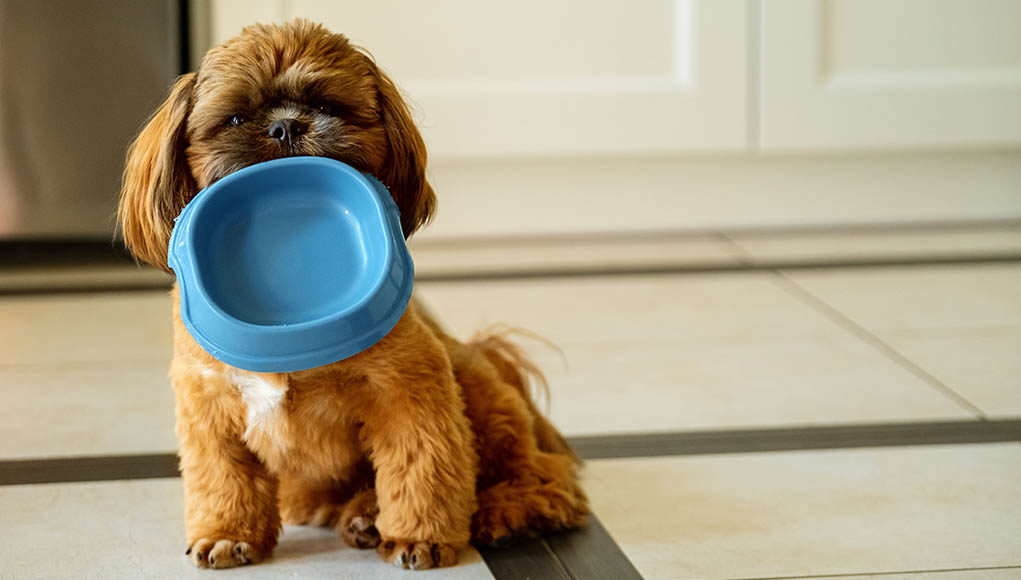Table of Contents
Ever seen a completely adorable furball turn into a wild beast devouring its food bowl in a heartbeat? See that wild beast at your home? Let's talk about how to stop your dog from guzzling down food.
There’s no denying meal time is one of the most exciting parts of the day. If you have to satisfy your hunger and be recharged with energy, I’d be exhilarated with it as well. Your buddy isn’t an exception.
Some dogs eat too fast because they are too excited, or too protective when it comes to their food. But whatever reason it may be, guzzling down food is not the best for your fur buddy.
Guzzling down food is not just a terrible behavior but it can be dangerous as well. Food guzzling can be rehabilitated if done early and properly.
Before anything else, we should understand why they are guzzling down food. Here are possible reasons why they are food guzzling.
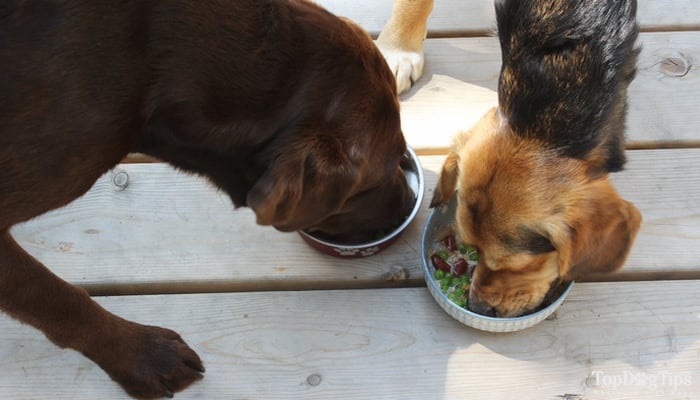
Why Your Dog Eats Too fast
Before we tackle how to stop your dog from guzzling down food, let's discuss what causes this problem. Is this a behavioral problem or are they just too hungry?
Competitive Eating
If you have more than one dog, this may be a possible reason why your dog is guzzling down food in a jiffy. Dogs may develop food aggression when they have competition in food.
Food is a daily necessity. If they feel that their food may not be secure, it may result in guzzling down food, guarding their food, and protecting food aggressively from others.
If they have to fight for their food, they can develop defensive behavior.
No Feeding Routine
You’re not you when you’re? Yup, hungry.
Scheduled feeding time is important for domestic dogs. Unlike wild dogs, hunting is necessary to obtain a meal for the day. You can’t blame them for demolishing the meal in an eye blink when they’re hungry.
If your dog does not eat for the day, they’ll tend to eat the food quickly out of hunger and desperation to eat.
Unvaried Food
If your dog sees you eating different cuisines daily and they eat the same thing every day, they’ll feel envious just from the scent of what you’re eating.
Remember dogs have much more heightened olfactory sense than us humans. What smells good to us, smells extra great to them.
If they get access to this various food, they’ll tend to swallow it quickly and find the opportunity to find more.
Unmet Nourishment
Dogs require a variety of nutrients. If dogs lack a certain nutrient or are given too much of another, changes in their behavior may be a response to malnutrition.
Get your dog checked up to see if they lack certain nutrients. You can ask your veterinarian what food, nutrients, or supplements should be given more to your dog.
Dominance
If your dog seems to easily swipe your food away from you. Watch out, they may believe they’re the leader in that household.
If they can effortlessly steal food from you with you helplessly trying to manage the situation, you may need to re-evaluate your relationship.
Remember as owners, you should be seen as the leader and provider. If your fur buddy does not see you in this light, you may suffer from aggressive behavior and treatment from them.
Isn’t it alarming when they devour their food so fast and try to get some more? Doesn’t it feel disheartening when your pet growls at you or others for getting close when they’re eating?
It’s best to help our fur buddy change this behavior. It’s not just for us owners, it’s also what’s best for them.
Dogs who guzzle their food are at risk for so many complications.It could range from physical illness to mental or behavioral problems, and, in worst-case scenario, fatality.
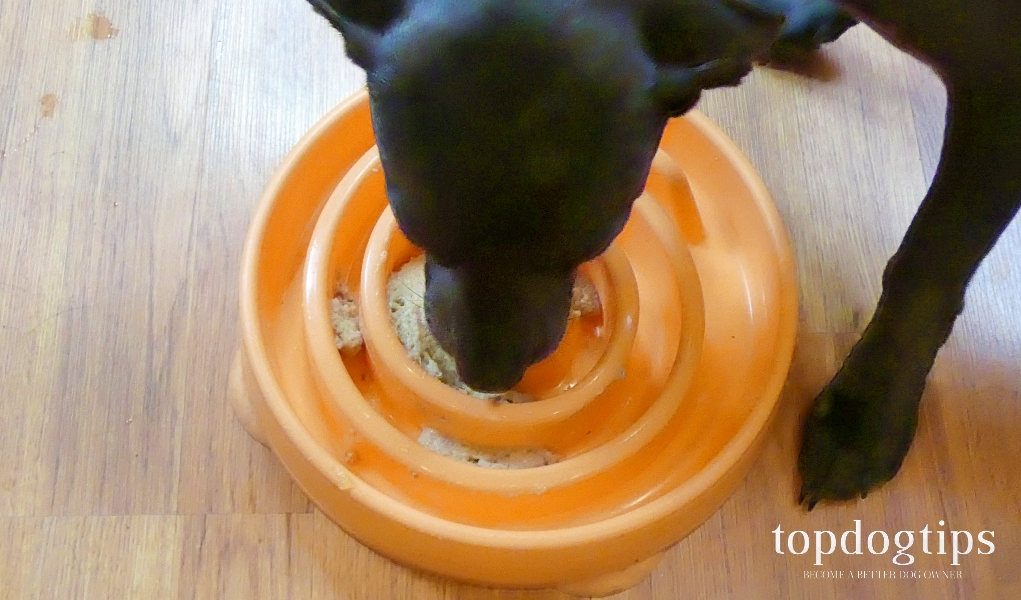
How to Stop Your Dog From Guzzling Down Food
Strict Feeding Schedule
The first thing you can do how to stop your dog from guzzling down food is to have a feeding schedule.
One of the most common reasons dogs guzzle their food is hunger. Dogs live for routines and that includes schedules.
Scheduling their meal time is important. If they are scheduled to eat at a certain time, dogs can digest properly with less risk of hyperacidity.
Dogs can become hyper acidic when they do not eat. The discomfort of hunger makes them react to eating aggressively. So it’s best to strictly stay on schedule with meal time.
Keep Food Out of Their Way if Possible
Dogs with food-guzzling behavior need help and change. That means changes in the behavior of the dog and the owner as well. Owners need to be considerate when they want to help their fur buddy.
Keeping food out from accessible areas can help them avoid being destructive to grab the food. If they can’t see it, they can’t reach it.
Interval to a Few
Eating the food quickly may be slowed when they’re given a few pieces instead. Ingesting food quickly can induce bloating, choking, upsetting the stomach, and vomiting. Try giving their food in smaller portions and intervals instead.
Give them a few kibbles or their food, wait for them to finish, and give them a few again. This can help them believe they are consuming more than they do so.
Since you are giving them bit by bit, they can eat it slowly, and may make them feel filled shortly.
Food Puzzles, Slower-Feeder Bowls, Balls, or Simply Trailers
These puzzles can help alter their behavior with food guzzling. Food puzzles are food contraption that has hidden compartments that needs to be moved for them to be accessed.
Getting stimulated by solving the puzzle and eating is a great way to slow down guzzling. Using their sense of smell, nudging the puzzle with their paw and nose can get them engrossed in the puzzle. Their focus is divided into eating and trying to get the food.
Slow-feeders do the same. The wavering highs and lows shape the bowl into an obstacle. The food is distributed in different spaces in small amounts.
A cheaper way is using tennis balls. Putting a tennis ball inside the bowl can create a barrier between the kibble and the dog. They’d have to work for them to eat.
Another cheaper way is to feed them by spreading the food like a trail on a mat or cookie sheet.
Using this device can help your dog get distracted from devouring the food and be more focused on trying to ingress the hidden edibles instead.
It does take time but that is the goal.
Separate Food Bowls
This is for owners who have more than one dog. Dogs may have food guarding behavior due to the possibility that the other dog may cram down on their food.
What’s the best thing to do is to have the dogs eat in a separate room or a distant space from each other. This is a very simple solution but is quite effective.
If your dog feels secure with its surroundings, it will be more comfortable to eat in a more leisurely way.
Add Water to Food
Another way to reduce guzzling down food is to add water to their food. This works well with dry food.
Since dogs use their tongue to catch food, they’ll be working hard flitting their way to the kibble with the water on the way.
Adding half an inch of the bowl with water is good enough. A very cheap and simple solution that can also help them hydrate more.
Varied Diet or Changing Food Quality
Imagine eating the same food every day. Won’t you lose it when you see other food compared to what you eat every day? If we can’t handle that, of course, our pet won’t be able to hold it in as well.
Providing your pet with a varied diet can help food guzzling. When your pet can taste other food rather than the same ones every day, the tendency to eat so quickly, to steal food from others or anywhere can be reduced to little to none.
Adding different flavors to their food once in a while is a great way for them to know that they can eat this food. Doing it at least every other two days can help them find satisfaction in food consumption.
Training — Understanding Owner and Food
Sometimes dogs may assert their dominance over their owners and they can get away with everything.
Retraining your dog for you to be in control and command may require mental power. It’s best to have a professional presentation or at least be taught by a professional.
It’s important for you as an owner to take control and assert authority. If your dog does not see you as an authority, they may overlook your leadership and lead things on their own. And that includes food.
Guzzling food from you, other dogs or even destructing everything just to access it can be a great issue.
A great way for them to see that you as an owner is the provider and not the taker of their food is by showing them you are the one preparing and giving the food. By showing this, they can desensitize their guarding behavior.
Food guarding can be aggressive behavior. If the guarding behavior is aggressive, it’s better to have a professional do it first instead. It’s best not to touch them in case of accidents.
Pretend to put food and give the empty food bowl to your dog. As they can see, it is empty. Pick up the food bowl carefully and make them see you put small kibbles then return it to them.
They may observe that the food comes from you, when they look back for more, then you can give some more. They may register that you provide them with the food.
Remember to keep it slow. Be careful and be sensitive to your dog’s reactions. If there is any discomfort or aggressive reactions, it’s best to have a professional do it or guide you instead.
Importance of Positive Reinforcement Training
Positive reinforcement training can also be a significant way to introduce good behavior to your dog. Using a delicious reward as positive reinforcement can influence response to a stimulus. This can also be done at home.
It’s important not to feed them when you’re having dinner on the table too. If they feel that they can get food from you that comes from the table, the tendency to steal and guzzle what you have is possible and high.
Practice this by using positive reinforcement. It can start at the dinner table. Have your dog stay in their bed, away from the table, and reward them with a delicious treat when they stay.
Try walking a few steps away from the bed. If they stay, reward them with a treat and praise. If not, point them towards the bed until they return.
Remember, do not give them a treat if the behavior is not followed. Dogs should be rewarded when they are working. If they are rewarded out of wanting to, training them with treats may lose its potency.
Repeat this with a few changes such as putting food on the table or eating the food. If they can stay without trying to guzzle your food, reward them with a treat and praise.
This should be repeated until they understand that they can get delicious feedback when they follow a command or behavior. You may seek professional trainers to help to teach and guide you in training your dog.
Of course, it’s not easy training but doing this can enhance your relationship with your dog. Plus, if you’re successful, this can finally solve the problem: how to stop your dog from guzzling down food.
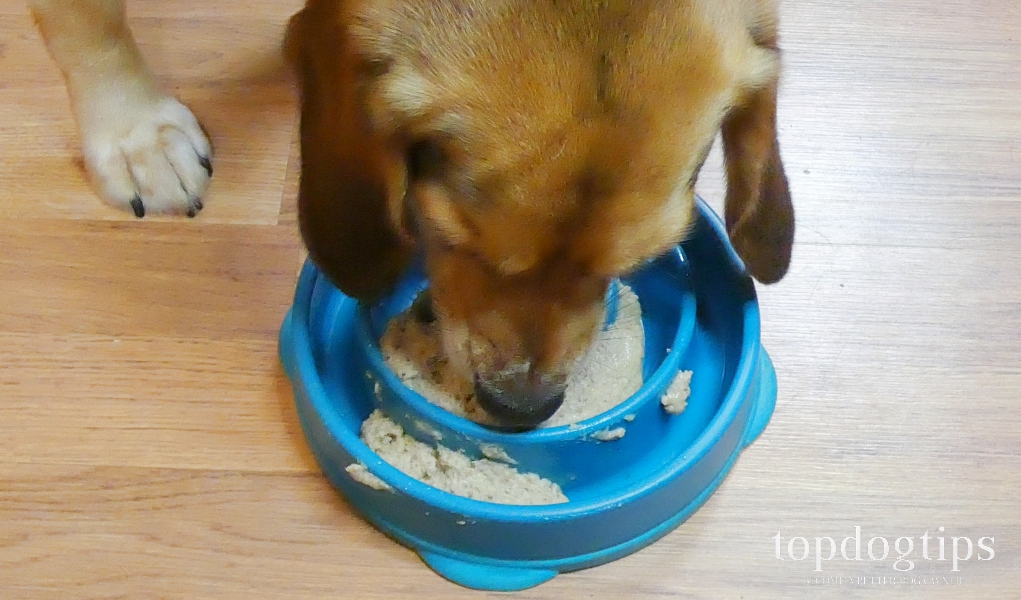
Correctional Training
Correctional Training can be an option to fix a dog’s guzzling problem. As owners, it’s always best to partake in your pet’s journey.
But if you are having a hard time doing it at home or by yourself, getting a professional to do it is always an alternative.
The good news is there is a variety of correctional training owners can do at home. One is with an alarm that would emit a very loud noise when the dog is trying to access the food. This is to associate the behavior with the loud unpleasant noise.
Owners can observe their dogs from afar. Prepare the food where they usually try to reach.
If the dog tries to access the food, pressing the alarm repeatedly can create an agitated feeling that can keep the dog from doing it again.
This should be repeated until the dog can recognize that the behavior results in unpleasant noises. This can help reduce guzzling behavior.
It’s best to be consistent when training dogs. Dogs should be trained with simplicity.
They should know what they can and cannot do. That means owners should be consistent and clear with what’s allowed or not allowed.
Training them should not be confusing to get consistent and efficient results.
What Happens if a Dog Eats Too Fast?
When a dog eats too fast they tend to choke or vomit but that’s not the only incident that can go wrong. Food guzzling can cause health problems from gastrointestinal problems such as bloating, choking, and liver disease.
They can develop chronic urinary diseases such as kidney disease and bladder problems. Food guzzling can also result in obesity which may develop into cardiovascular problems.
It can also develop diabetes mellitus, hypertension, cancer, and fatality.
These diseases are serious fatal diseases. It can either lower your dog’s life expectancy or ultimately end it.
Food guzzling can also emerge behavioral problems. Dogs can become excessively overprotective, overly territorial, extremely guarding, and very destructive
Behavioral problems can become very difficult for both the dog and owners. Living in anxiety and discomfort, a supposedly safe environment can become dangerous.
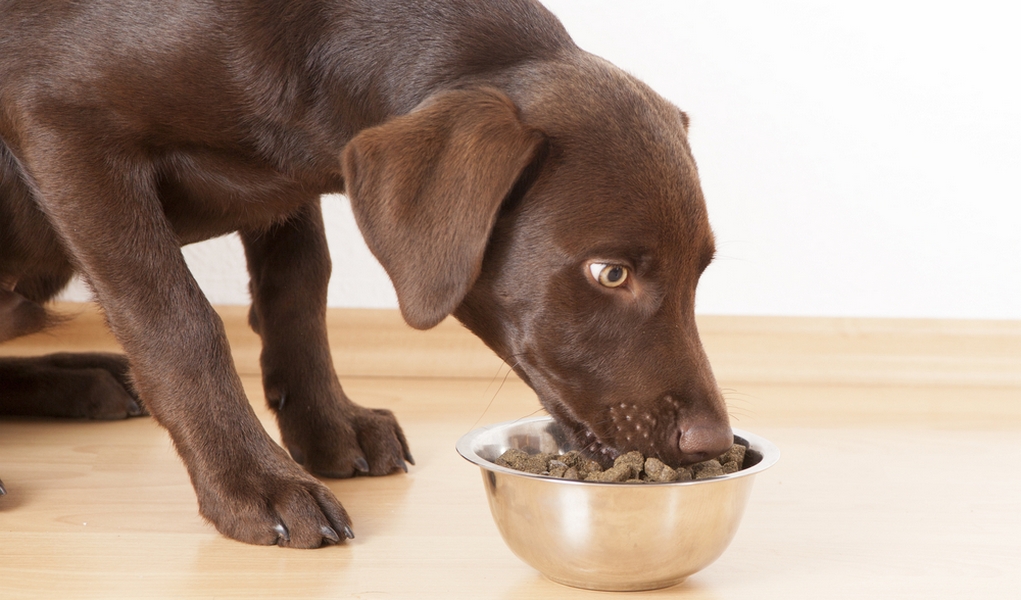
Frequently Asked Questions
How do you know if your dog eats too fast?
If your dog chokes or vomits after eating, it may be eating too fast. Dogs who are way too focused on their meal and get excited about it may also be a sign. If they are untouchable during mealtime, that could be a problem.
They may also be diagnosed with bloating or Gastric Dilation and Volvulus (GDV). This disorder in the gastric function can be lethal if left untreated.
Why do my dogs always act like they are starving?
Some dogs may find it hard to resist food. They can ve very greedy and glutton around it. Some dogs are just misunderstood.
It may seem that they have a competition with their food and they feel like they have to guard it. But generally, this behavior should make owners cautious.
Ask your veterinarian why is your pet hungry all the time. It may be a behavioral issue or a medical one.
How do I keep my dog from scavenging in my house?
You can simply distract your dog with its favorite toy or give him treats to keep him occupied. The best way to keep them from scavenging is to train them with simple yet solid commands like “stay” and “leave it”.
Owners should be responsible and do their part in taking care of pets. Guzzling food down is an overlooked problem most owners disregard. It’s important to modify this behavior to help our fur buddy.

How to Stop Your Dog From Guzzling Down Food — Final Thoughts
If you've ever noticed that your dog eats too fast, you'll need to know how to stop your dog from guzzling down food.
It may be hard work and time-consuming but helping our fur buddies grow out of this behavior can help them in the long run. We can lengthen their life expectancy if we help them solve this problem.
This behavior is not solved over a day. This requires patience, persistence, and devotion.
Results may not be seen immediately but if you stay consistent and determined to help your dog, your efforts will not go to waste.
Remember to also be sensitive to your dog’s condition. Food guzzling can also be a symptom of underlying health issues.
It’s best to have your dog checked with the veterinarian if you have observed any unusual symptoms.
Let’s help our dogs one step at a time. Regular checkups should be a routine. And maybe slowing their savage appetite can be a start.
READ NEXT: DOG NUTRITION 101: WHAT DO DOGS EAT


